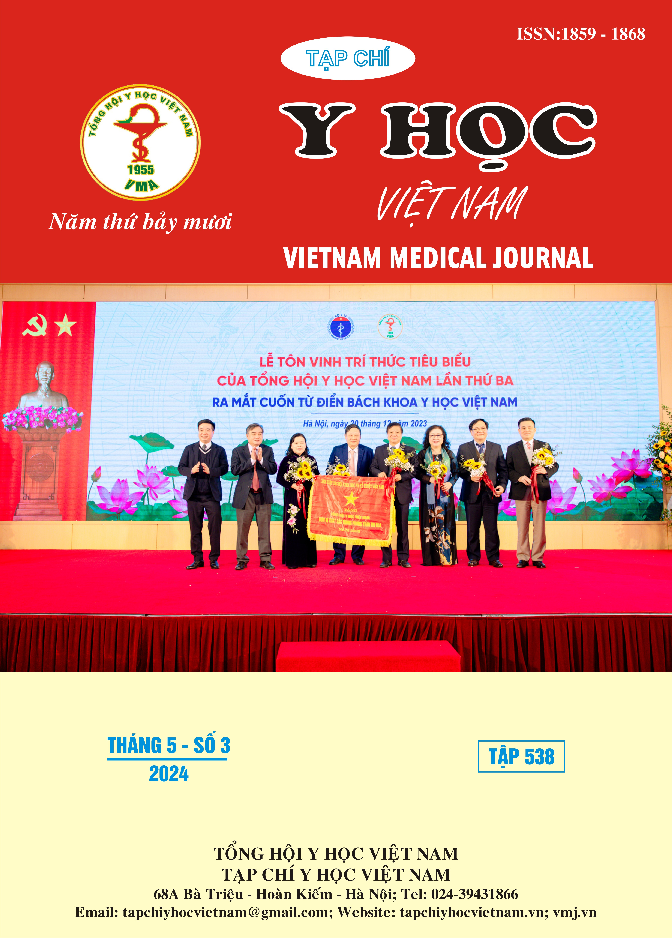OBSTETRIC RESULTS AFTER BIPOLAR CORD COAGULATION PROCEDURE IN SELECTIVE FETAL GROWTH RESTRICTION IN TWIN PREGNANCY PATHOLOGY
Main Article Content
Abstract
Objective: Results after bipolar cord coagulation procedure for selective fetal growth restriction in twin pregnancies. Objects and Methods: Cross-sectional descriptive observational study of 19 cases of selective fetal growth restriction in twin pregnancies undergoing bipolar cord coagulation surgery at the Fetal Intervention Center of Hanoi Obstetrics and Gynecology Hospital in 2023-2024. Results: In 19 surgical cases, the postpartum survival rate was 94.4%, and postpartum mortality rate was 5.6% due to extreme prematurity. The average gestational age at birth is 35.4 weeks. Complications such as: rupture of membranes, miscarriage, premature birth, bleeding within 48 hours after surgery were not recorded. Conclusion: Bipolar cord coagulation procedure in selective intrauterine growth restriction is an effective technique, bringing high survival rates.
Article Details
Keywords
twin pregnancies, selective fetal growth restriction, bipolar cord coagulation
References
2. Batsry L, Matatyahu N, Avnet H, et al. Perinatal outcome of monochorionic diamniotic twin pregnancy complicated by selective intrauterine growth restriction according to umbilical artery Doppler flow pattern: single-center study using strict fetal surveillance protocol. Ultrasound Obstet Gynecol. 2021;57(5): 748-755. doi:10.1002/uog.22128
3. K I, T M, Y T, et al. Perinatal outcome of monochorionic twins with selective intrauterine growth restriction and different types of umbilical artery Doppler under expectant management. Fetal diagnosis and therapy. 2009;26(3). doi:10. 1159/000253880
4. Mm L, Ma R, M D, et al. Bipolar cord coagulation for selective feticide in complicated monochorionic twin pregnancies: 118 consecutive cases at a single center. Ultrasound in obstetrics & gynecology : the official journal of the International Society of Ultrasound in Obstetrics and Gynecology. 2012;39(4). doi:10.1002 /uog.11073
5. Bebbington MW, Danzer E, Moldenhauer J, Khalek N, Johnson MP. Radiofrequency ablation vs bipolar umbilical cord coagulation in the management of complicated monochorionic pregnancies. Ultrasound in Obstetrics & Gynecology. 2012; 40(3): 319-324. doi:10.1002/ uog.11122
6. L L, E G, E O, et al. Pregnancy and infant outcome of 80 consecutive cord coagulations in complicated monochorionic multiple pregnancies. American journal of obstetrics and gynecology. 2006;194(3). doi:10.1016/j.ajog.2005.09.013
7. Peng R, Xie HN, Lin MF, et al. Clinical Outcomes after Selective Fetal Reduction of Complicated Monochorionic Twins with Radiofrequency Ablation and Bipolar Cord Coagulation. Gynecologic and Obstetric Investigation. 2016;81(6):552-558. doi: 10.1159/ 000445291


